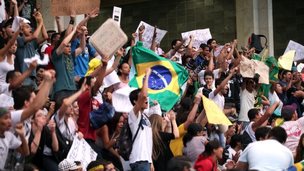Protests spread throughout Brazil
 As many as 200,000 people have marched through the streets of Brazil's biggest cities, as protests over rising public transport costs and the expense of staging the 2014 World Cup have spread.
As many as 200,000 people have marched through the streets of Brazil's biggest cities, as protests over rising public transport costs and the expense of staging the 2014 World Cup have spread.
The biggest demonstrations were in Rio de Janeiro, where 100,000 people joined a mainly peaceful march.
In the capital, Brasilia, people breached security at the National Congress building and scaled its roof.
The protests are the largest seen in Brazil for more than 20 years.
The trigger was a 2 June increase in the price of a single bus fare in Sao Paulo from 3 reals ($1.40, £0.90) to 3.20. Authorities said the rise was well below inflation, which since the last price increase in January 2011 has been 15.5%, according to official figures.
In the country soon due to host the World Cup and Olympics, many are now complaining that vast sums of money are being wasted instead of used for health and education, says the BBC's Gary Duffy in Sao Paulo.
Political leaders have also been accused of nepotism and corruption.
'Legitimate'
Protests were reported in as many as 11 cities on Monday.
Demonstrators chanted slogans, including "The people have awakened", the BBC's Julia Carneiro reports from Sao Paulo.
The demonstrations were relatively peaceful, though some of the 100,000 people estimated to have taken to the streets in Rio de Janeiro threw rocks at police, wounding five officers, set fire to a car and vandalised the state assembly building, starting a small blaze.
The police reportedly used tear gas, pepper spray and rubber bullets to disperse them.
There were also clashes with police in Belo Horizonte, which was hosting the latest game in the Confederations Cup, the warm-up tournament for the World Cup. An 18-year-old is reportedly in a stable condition in hospital after falling from an overpass in the city.
And in Brasilia, more than 200 protesters managed to get onto the roof of the National Congress building. After negotiations with police, the crowd agreed to leave. Later, youths formed a human chain around the building, the AFP news agency said.
In Sao Paulo, some 65,000 protesters gathered at a central plaza before moving off in three directions, bringing the main avenues to a standstill.
Police stood by and watched the demonstrations, in contrast to last week when clashes in the city led to dozens of injuries and claims of excessive use of force by police. Police denied they had acted unlawfully but said they would investigate the allegations.
Security chiefs had met protest organisers earlier on Monday in an attempt to avert trouble and announced that regular police would not carry rubber bullet guns at the demonstration.
There were also protests in the cities of Vitoria, Novo Hamburgo, Belem and Maceio, where a student was reportedly shot in the face by a motorist angry with a crowd that blocked the road.
"Peaceful demonstrations are legitimate," President Dilma Rousseff said in a statement. "It is natural for the young to demonstrate."
However, Sports Minister Aldo Rebelo warned protesters that the authorities would not allow them to disrupt the Confederations Cup or next year's World Cup.
"The government assumed the responsibility and the honour to stage these two international events and will do so, ensuring the security and integrity of the fans and tourists," he said.
Before Saturday's opening Confederations Cup match in the capital, Brasilia, protesters tried to approach the Mane Garrincha stadium, but were dispersed by the police.
The following day, a similar march close to the Maracana stadium in Rio de Janeiro was ended by police with rubber bullets and tear gas.
-BBC
